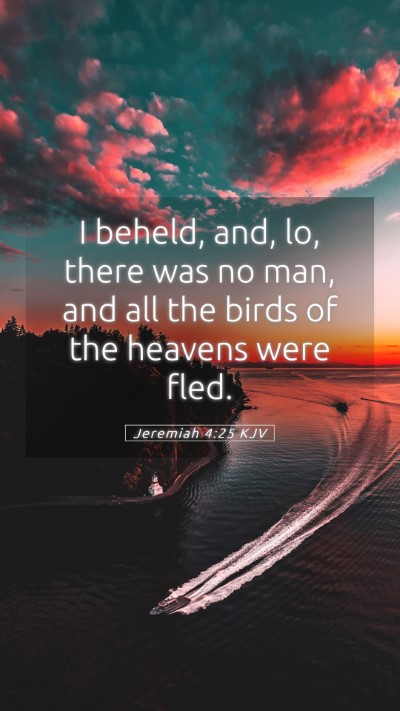Jeremiah 4:25 - Bible Verse Meaning and Commentary
In this exploration of Jeremiah 4:25, we delve into the profound implications of this Bible verse and seek to illuminate its meaning through extensive commentary from early theologians like Matthew Henry, Albert Barnes, and Adam Clarke. This analysis serves as a resource for anyone seeking to deepen their understanding of scripture.
Contextual Background
Jeremiah, known as the weeping prophet, delivered God’s messages to the people of Israel during a time of great turmoil and impending judgment. This particular verse reflects the desolation and void that would come upon the land due to the people's unfaithfulness and the consequences of turning away from God.
Bible Verse Analysis
Biblical Text
“I looked, and behold, there was no man, and all the birds of the heavens had fled.” (Jeremiah 4:25)
Understanding Jeremiah 4:25
This verse describes a vision of desolation, emphasizing an absence of life and vitality. Each commentary provides unique insights:
- Matthew Henry: Henry points out that this verse symbolizes the complete devastation of the land, highlighting the severe consequences of sin. His commentary suggests that the absence of man and birds signifies a divine judgment that leaves the land barren. Henry emphasizes the severity of God's displeasure and the resultant emptiness that sin can bring into an individual's life.
- Albert Barnes: Barnes elaborates on the implications of the phrase "there was no man," interpreting it as a direct consequence of Israel's idolatry and rebellion against God. He underscores that this judgment serves as a warning to the living about the dire repercussions of forsaking God. His interpretation points to the importance of repentance and returning to divine favor.
- Adam Clarke: Clarke delves into the prophetic nature of Jeremiah’s vision, suggesting that it acts as a foreshadowing of the destruction that awaited Jerusalem. He discusses how this desolation is not merely physical but also spiritual, signifying a larger context of societal and moral collapse. Clarke emphasizes the need for collective responsibility in maintaining faithfulness to God.
Thematic Elements
- Desolation: Reflecting on the themes of emptiness and absence, this verse serves as a stark reminder of what happens when a society strays from its covenant with God.
- Consequences of Sin: The imagery reflects the broader biblical narrative where disobedience leads to dire consequences, serving as a warning to readers today.
- Prophetic Vision: The verse holds significant prophetic weight, indicating not just immediate judgment but a larger theological theme of divine retribution and mercy.
Application of the Verse
This passage calls for introspection and reflection on one’s spiritual state. Just as Jeremiah’s time was marked by strife due to turning away from God, modern readers can draw parallels:
- Self-Examination: It invites believers to assess their lives and ensure they are still aligned with God's commands.
- Communal Responsibility: Encourages groups and congregations to come together for prayer and repentance, acknowledging their collective need for God’s mercy.
- Hope amidst Desolation: Even in desolation, there is a call to recognize God’s desire for redemption and restoration.
Related Biblical Cross References
- Isaiah 24:1: Discusses the Lord's judgment leading to devastation.
- Ezekiel 33:11: Emphasizes God’s desire for sinners to turn and live.
- Hosea 4:3: Where the land mourns due to the people's unfaithfulness.
Conclusion
In summary, Jeremiah 4:25 serves as a powerful reminder of the consequences of straying from the path that God has laid out. Through understanding this verse within its context and theological implications, believers can find profound lessons applicable to modern life. The insights drawn from Matthew Henry, Albert Barnes, and Adam Clarke enrich our Bible verse understanding and inform our daily walk with faith.
This analysis stands as a vital resource for Bible study groups and individuals engaging in online Bible study. It aids in scripture analysis and fosters discussions on the historical context and meaning of Bible verses.


